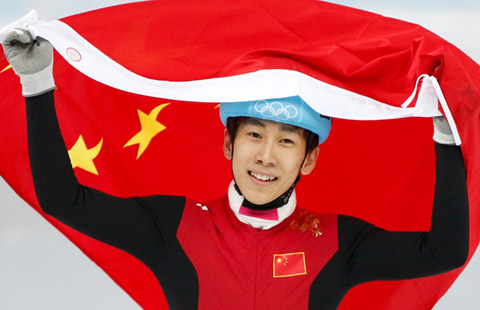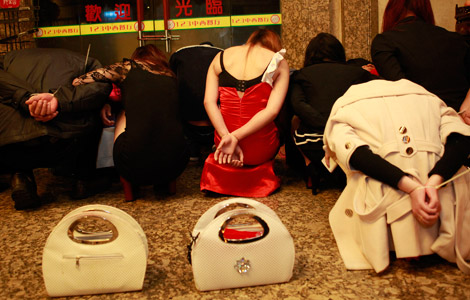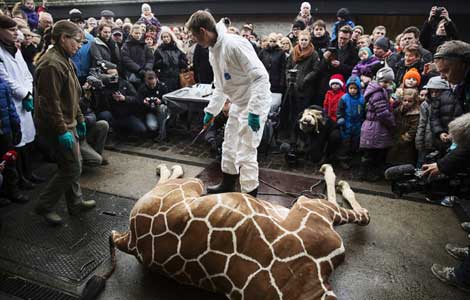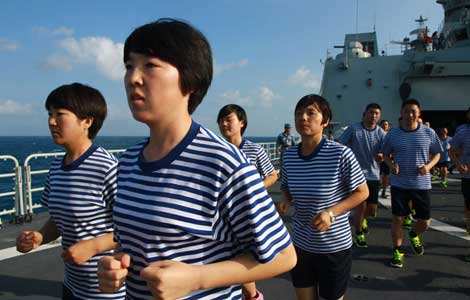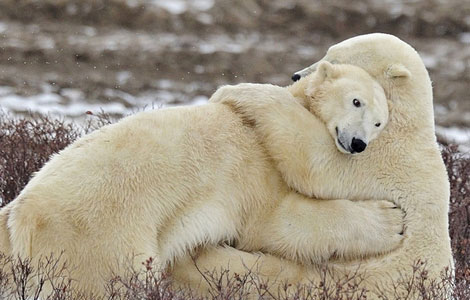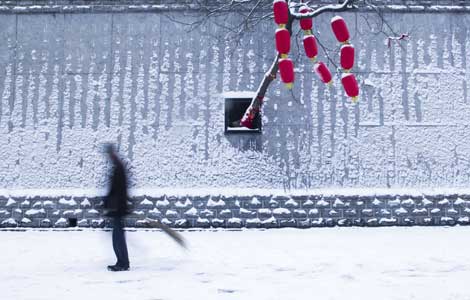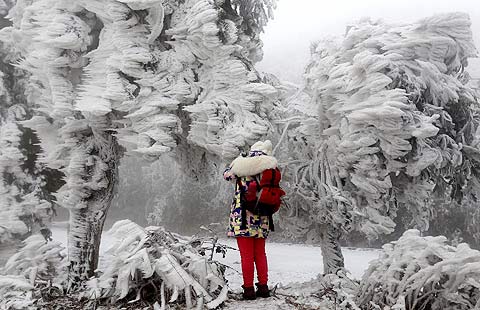Into an abyss of disgrace
Updated: 2014-02-12 07:02
By Bu Ping (China Daily USA)
|
|||||||||
Despite Abe's abject denials of the historical truth and evidence, Japan is still liable for its wartime crimes against humanity
Among world leaders, Japanese Prime Minister Shinzo Abe is unparalleled in making headlines for the wrong reasons.
Since he became Japan's leader for the second time, Abe has more than once come under fire because of his controversial comments, one of which was his remark that the definition of "aggression" has yet to be established in the international community or academia. His publicity stunts, from wearing a camouflage jacket and helmet waving from a tank to posing inside a training jet emblazoned with the number "731", a reminder of the imperial Japanese army's notorious Unit 731 that conducted horrific human experiments during World War II, have also been widely condemned.
But it was his year-end visit to the controversial Yasukuni Shrine that honors 14 Class-A war criminals that proved his words and acts could not be taken in anything but a militarist way.
Japan's war crimes are beyond dispute. During the Tokyo war crime trials (1946-48), groups of major political and military leaders in Japan were indicted on 55 counts of "crimes against peace", "conventional war crimes", and "crimes against humanity", among which Class-A charges were brought against Japan's top leaders who had plotted and organized crimes against peace.
After the end of WWII, former prime minister Nobusuke Kishi was at the forefront of those encouraging revisionism and he even dedicated a headstone to seven war criminals executed after the Tokyo trials honoring them as "patriots who died for their country". Coming from the Kishi family, Abe has stepped into his maternal grandfather's shoes and has now gone even further down the revisionist path, claiming that the Tokyo Trials were merely "victor's justice" and the Japanese wartime leaders charged with Class-A war crimes are "not war criminals under Japan's laws".
The truth is that even if Abe acknowledged the verdicts of the Tokyo Trials, it would not be enough, as most of the court battles centered on substantiating the crimes against peace charges, with the crimes against humanity a lower-profile part of the trials.
However, the general definition of crimes against humanity includes murder, extermination, enslavement, deportation and other inhumane acts committed against civilian populations, and persecutions on political, racial or religious grounds, whether or not in violation of the domestic laws of the country where perpetrated. Anyone who has a role in planning, organizing, or instigating the aforementioned acts should be held accountable.
In this sense, Japan's use of forced labor and the coerced recruitment of what it euphemistically calls "comfort women", namely the women and girls forced into sexual slavery to serve the Japanese military during WWII, and its illegal use of chemical or biological weapons are all crimes against humanity that were overlooked in postwar trials and should be re-examined today.
The issue of the women forced into sexual slavery by Japan was first raised at the United Nations by a civilian group in February 1992 and a Special Rapporteur was tasked with checking the issue. In her 1998 report, the UN's Special Rapporteur Gay J. McDougall concluded, "the Japanese Government remains liable for grave violations of human rights and humanitarian law, violations that amount in their totality to crimes against humanity. The Japanese Government's arguments to the contrary, including arguments that seek to attack the underlying humanitarian law prohibition of enslavement and rape, remain as unpersuasive today as they were when they were first raised before the Nrnberg war crimes tribunal more than 50 years ago."
Despite all the evidence, including first-hand testimonies, and the condemnation of the international community, Abe publicly declared that there was "no evidence" that women had been coerced into sexual slavery when he first became prime minister in 2006. Now, in office for the second time, Abe has said he intends to review the 1993 Kono Statement, which expresses remorse to former "comfort women".
Abe is certainly not reticent when it comes to showing his revisionist streak, but his worrisome rhetoric denying Japan's war crimes against humanity and its liabilities, and his step-by-step but relentless efforts to revise the Constitution and rearm Japan, have dragged Japan into an abyss of disgrace. A real danger to the international community as well as Japan looms large as Abe's words and acts mirror those of war-time politicians of militarist Japan.
So far this year, Abe has visited India, the Middle East and Africa as part of his diplomatic strategy, but while this may have succeeded in increasing the business opportunities for his country, he has not won any sympathy or repaired the damage he has caused to Japan's image in the international community with his denials-of-the-truth posturing. He never will unless he truly repents.
The author is a researcher with the Institute of Modern History at the Chinese Academy of Social Sciences.
(China Daily USA 02/12/2014 page11)
Most Viewed
Editor's Picks

|

|

|

|
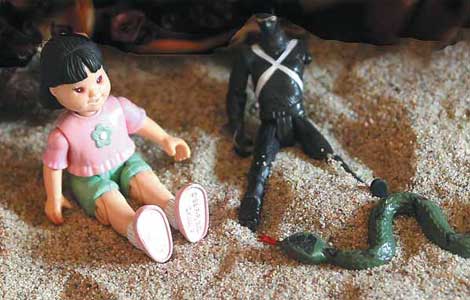
|

|
Today's Top News
Wine critic to start world tour in Beijing
China sends contingent to US-Thailand drill
Tokyo unveils armed forces reforms
Old palace columns coming home
Liaison mechanism to link Straits
Kerry seeks to 'rule out' possibility of conflict
Official cars to be auctioned in NE China city
Joint operation ensnares poachers
US Weekly

|

|


